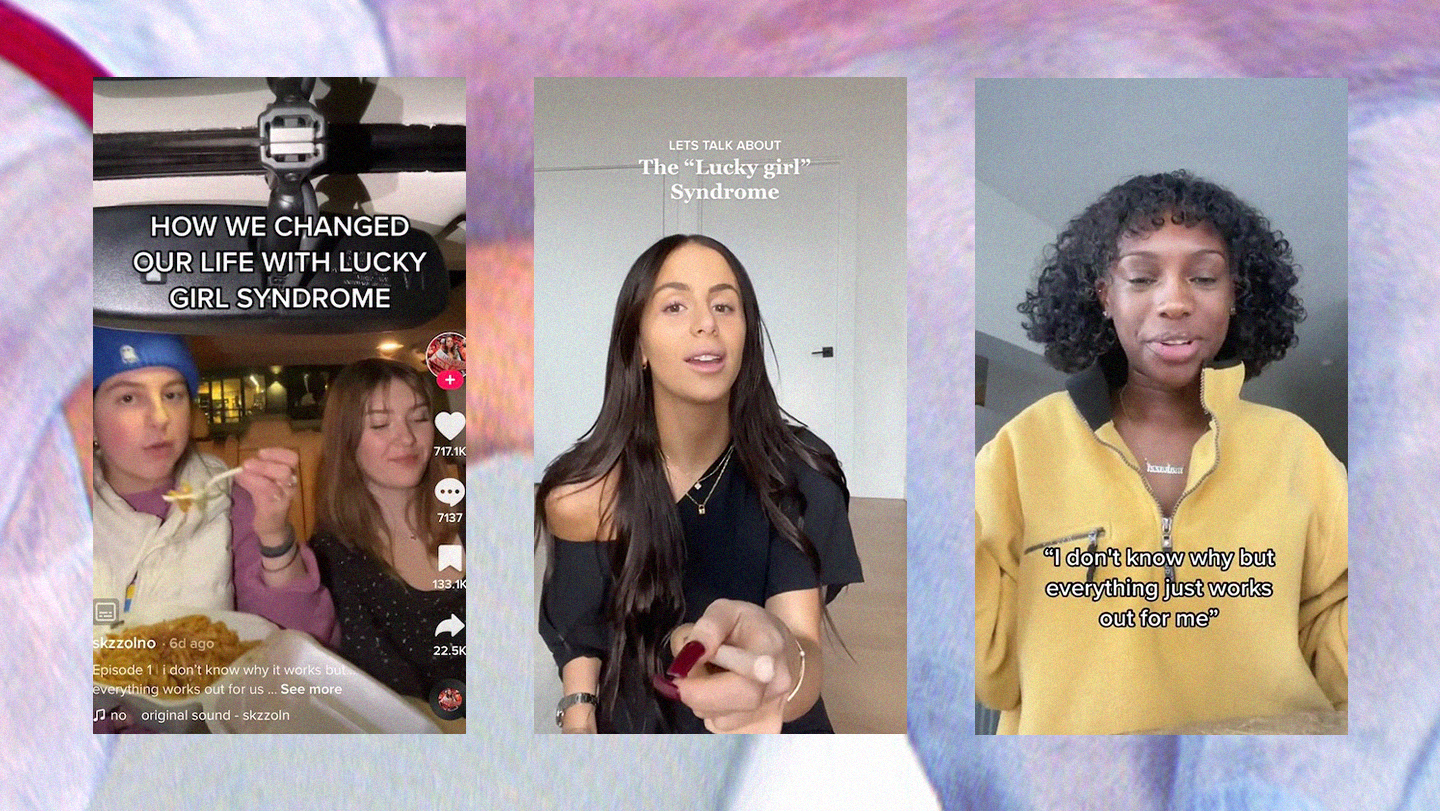It’s probably not a coincidence that Lucky Girl Syndrome, TikTok’s latest micro-trend, has become a thing around the new year.
The temptation to redo your life in January is as old as time immemorial, but, as the world has become more difficult, more expensive and, it feels at least, more grey than ever before, our tactics for achieving enlightenment, wholesomeness, goodness and wealth have become increasingly extreme. Previously, the most irritating New Year’s resolutions we would have to contend with were the ones smugly announced (Veganuary) or doomed to fail (Dry January). All resolutions, and the idea that a random date in the calendar will transform us into better people are, of course, delusional. But this year social media has upped the ante; we introduce to you, Lucky Girl Syndrome.
Of course, if you use TikTok or have been online since the beginning of the year — how’s your digital detox going? — you might have already heard about Lucky Girl Syndrome. Its surge in popularity first began with TikTok influencer Laura Galebe, who introduced the world to the manifestation technique that simply involves telling yourself: “I’m so lucky. I’m one of the luckiest people I know. Everything works out for me in the end.” She promises that simply telling ourselves this, and believing it, will result in opportunities abound and an instantly better life. The clip, viewed almost three million times, was followed by another video from user, @skzzolno, who extolled the virtues of LGS. This one, posted a day before New Year’s Eve, was perfectly timed to have us blindly believing in a better tomorrow.
Accumulating almost 60 million views, #LuckyGirlSyndrome may not have reached the dizzying heights of other pseudo psychology trends on TikTok, but it has already received coverage in The Sun, Daily Mail and NY Post; the latter defining it as “Gen Z’s entitled, ‘life-changing’ new way of getting whatever they want — without having to work for it”. All of this breathless content and coverage is a shame, if only because — obviously — none of it is real. As much as we might like to tell ourselves otherwise, we can’t transform our lives, luck and circumstances simply by telling ourselves so really, really hard that we can. Even Laura herself, in her original video, captions the technique “BE DELUSIONAL”. And that’s what Lucky Girl Syndrome is: peak delusion.
Manifestations have been around for much longer than Lucky Girl Syndrome, and they’re not inherently harmful. Looking at our own reflections and telling ourselves positive things — I’m good, I’m kind, I’m beautiful, I’m enough — might have seemed cheugy at first, but they’re a mainstream and accepted psychological technique, that have been shown to make us happier, more confident, and more resilient. There’s no magic to traditional manifestation; it’s simple psychology. The law of attraction is really just the idea that if we are more positive, other people will want to be around us more. The theory of abundance dictates that being happy for others makes us happier ourselves. Journaling helps us process our emotions. It’s straightforward, mundane!
The difference between manifestation (generally speaking) and Lucky Girl Syndrome specifically, is that, while manifestation can help us find inner strength and focus on aspects of our lives we can control, LGS pretends that we can somehow think the universe into changing in our favour, and that “everything will work out for us”. By manifesting outwards rather than inwards, we not only lose any personal benefit, but we also absolve ourselves of any responsibility to try to be better people. The self-esteem boosting effects of traditional manifestation are lost because the concept of ‘luck’ is so flimsy. We don’t have to actually try to make better choices, be more confident or work towards making sure things do work out for us, if we’re simply ‘lucky’.
This isn’t to say, of course, that some bad things in our lives and the universe aren’t the result of simple bad luck. Sometimes we try our best and things don’t work out. Very often bad things happen to good people. Accepting this eventuality and being hardy enough to continue on in spite of it — the ol’ indomitable human spirit — is an important skill and one that we lose, leaving ourselves open to collapse in the face of disappointment, if we simply blindly attribute all our failures to “unluckiness” or not being delusional enough in our manifestation techniques.
Even TikTok — the internet epicentre of delusion, the place where people openly post “CLAIM with positivity” under tarot card videos promising that their exes are going to come back — has begun to turn on LGS. One video rightly points out that we should be careful buying into the ideology because of how closely it lends itself to imposter syndrome. “If you tell yourself you’re ‘the luckiest girl in the world’ anytime you work real hard and improve[d] your grades, land[ed] a job offer etc, you can end up full of self doubt and like you didn’t actually earn it”. Worse still, it’s also an example of the kind of toxic positivity or toxic optimism that rejects difficult emotions in favour of adopting a false, cheerful facade. Of course, the temptation to embrace a mantra or luck above all else is tempting (have I said it to myself in the mirror in the first nine days of the year? No comment). Why change anything about our lives, which is hard, when we could simply smile through it and call ourselves lucky and believe it’ll work out in the end? Bookmark this article and return to it in the cold light of February to let us know how that goes.


